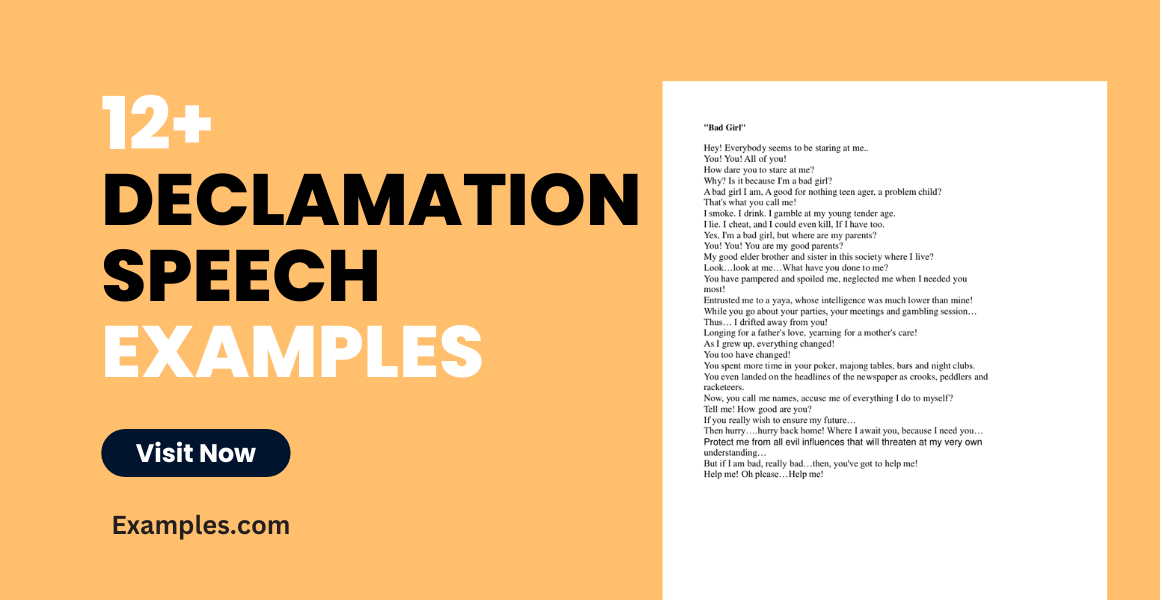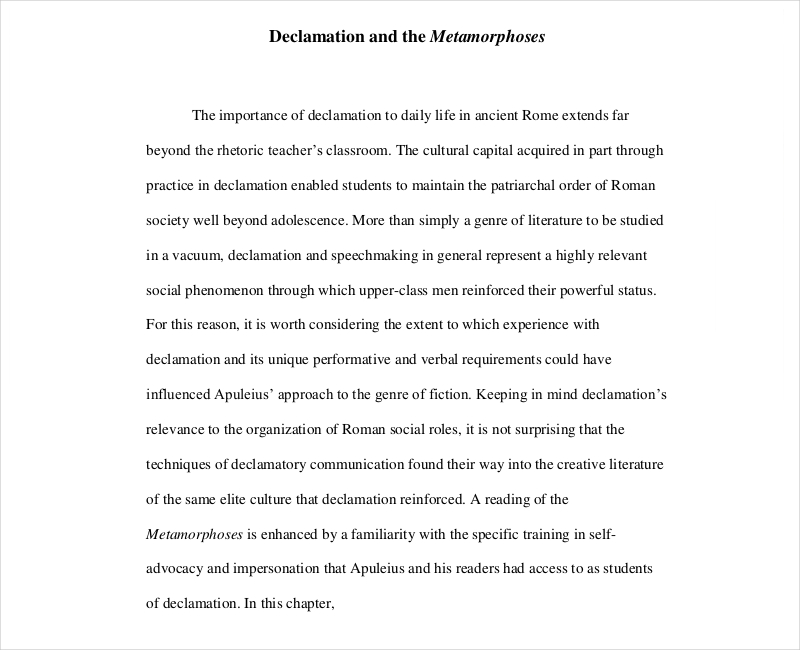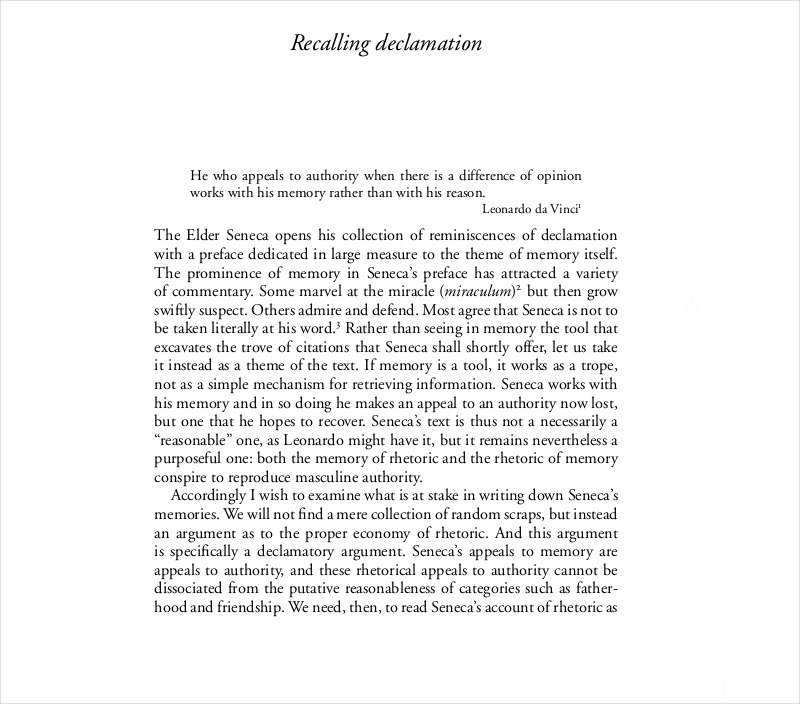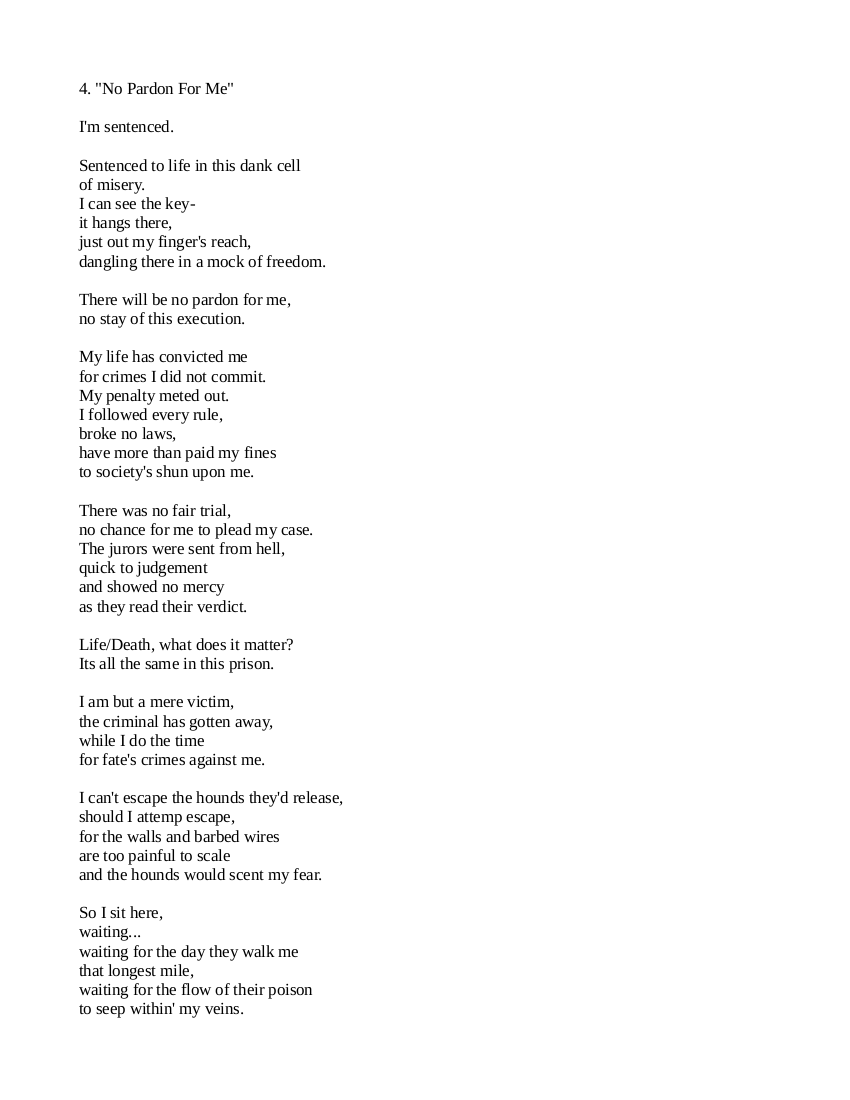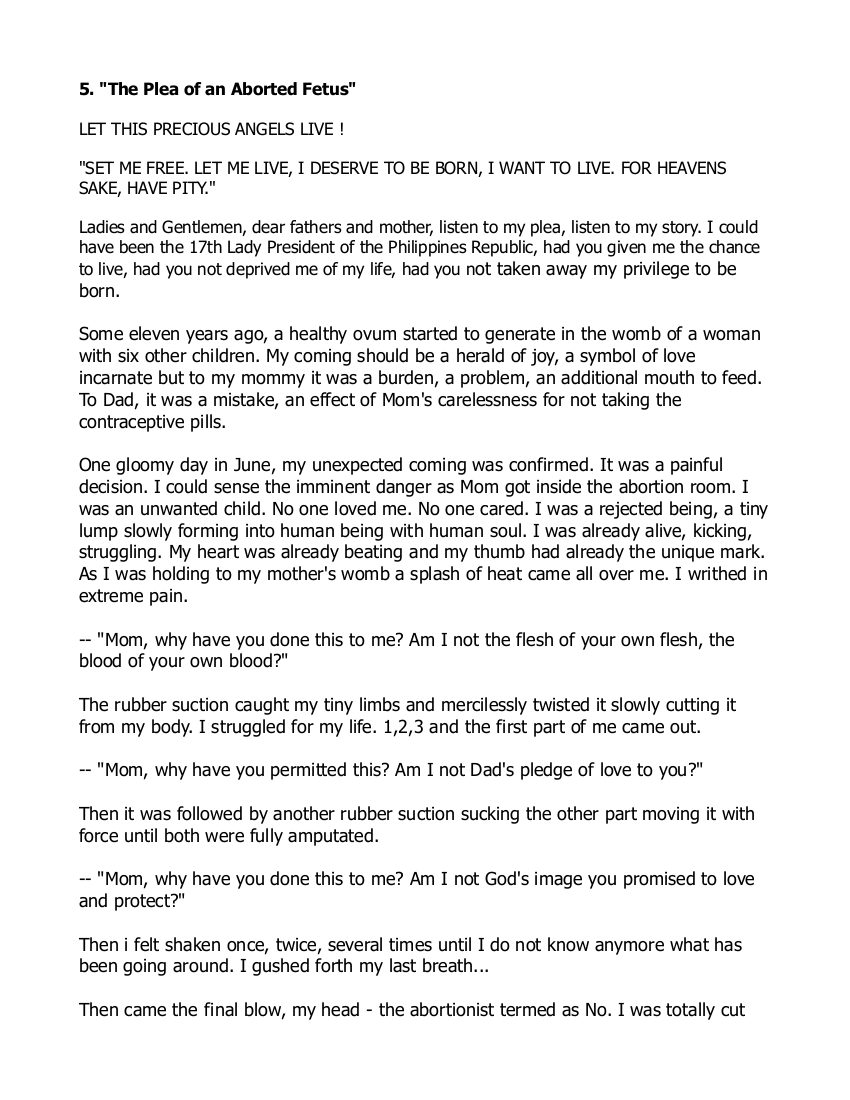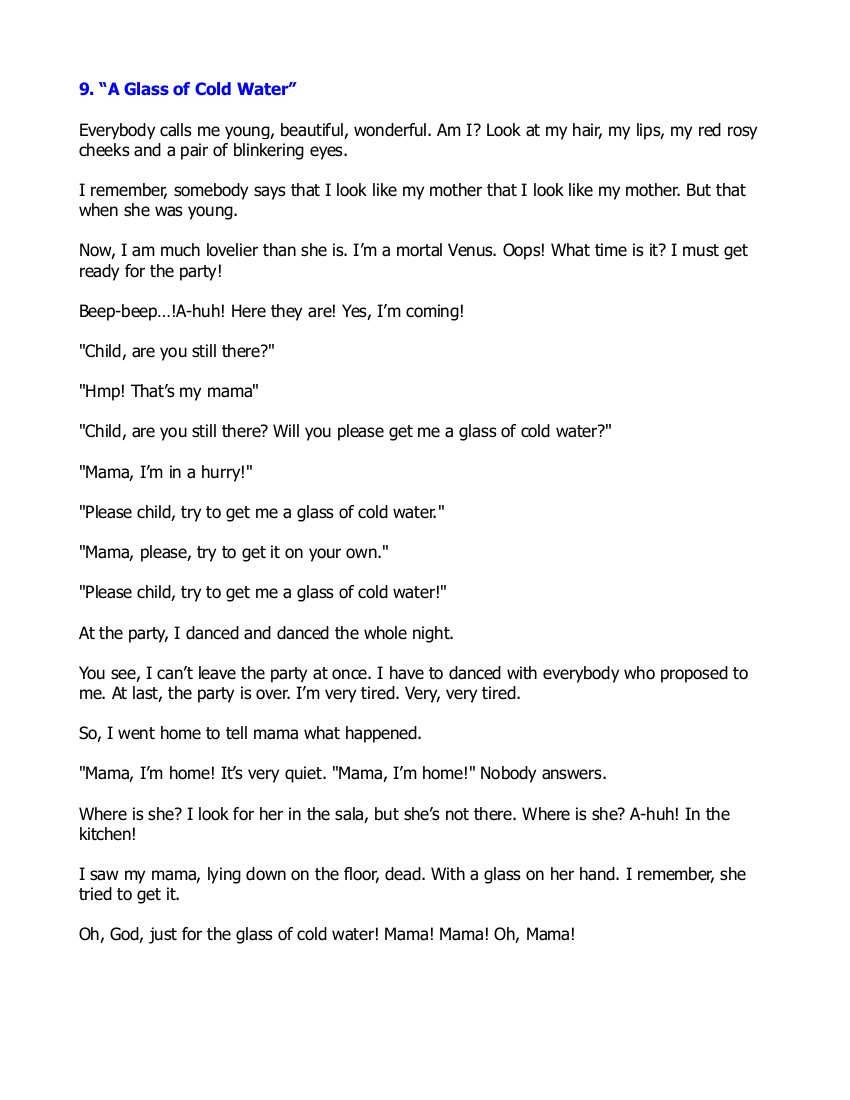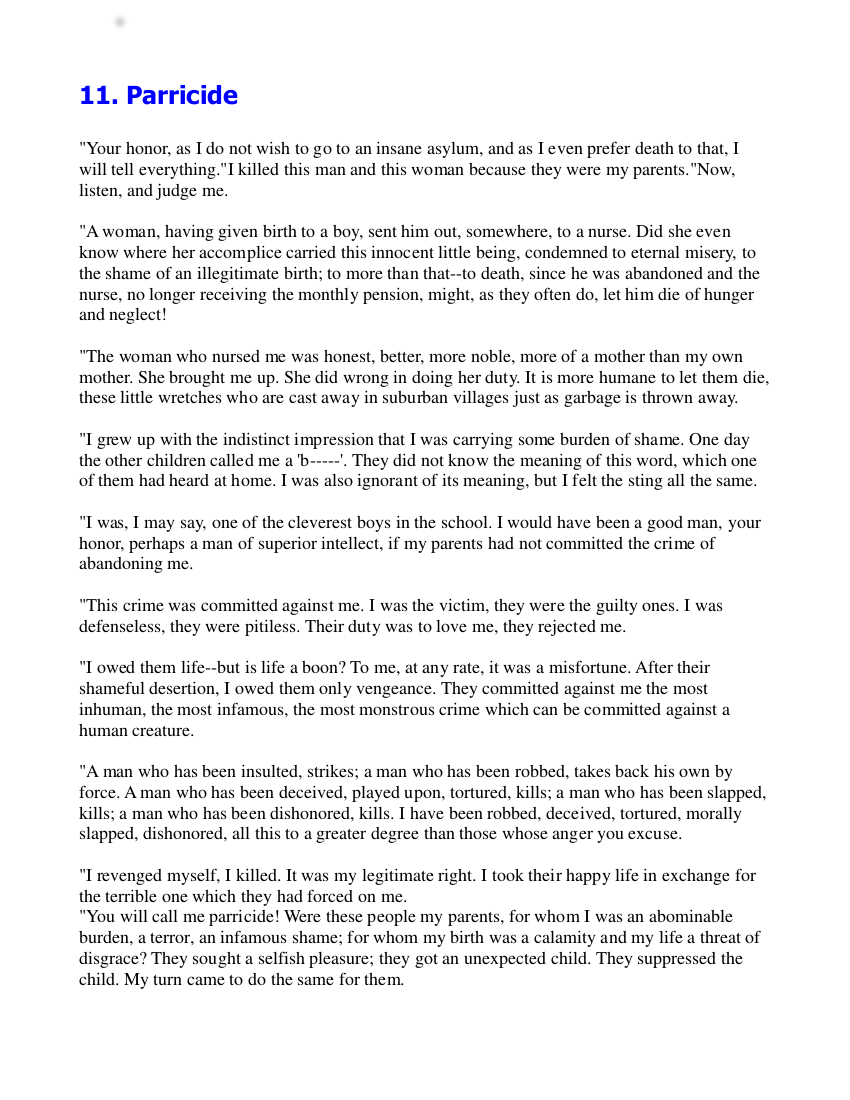12+ Declamation Speech Examples to Download
You might have had an assignment as a student where you have to present a speech in front of the class. Most of the time, you are to present a declamation speech. You might have had difficulty on how to deliver your declamation piece. You might also have had a predicament on what to deliver for your declamation speech. Lastly, you might have had a problem on where to start with your speech and how to present it; let alone how to start to write an outline for your speech.
What is Declamation in Speech? – Definition
Declamation in speech is an expressive and powerful way of speaking that emphasizes emotion, clarity, and engagement with the audience. This style of speech is particularly effective in various contexts, such as welcome speeches, motivational speeches, celebration speeches, narrative speeches, and appreciation speeches. Declamation involves delivering a speech with passion and intensity, making the content more impactful and memorable for the audience.
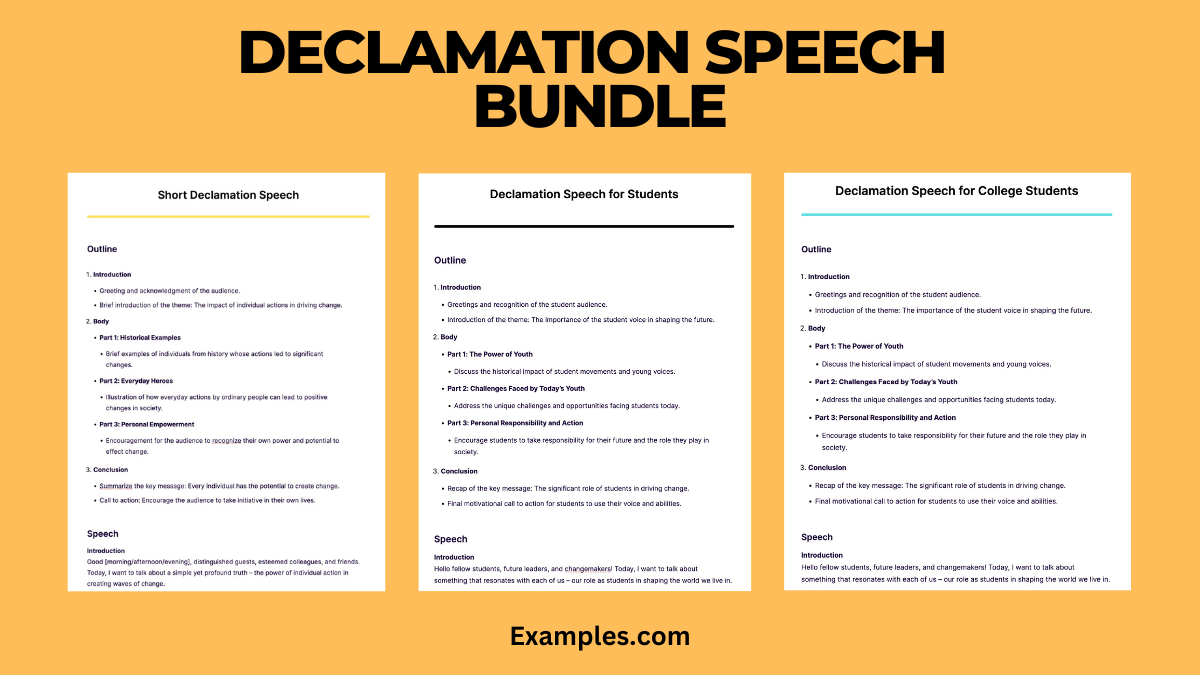
Download Declamation Speech Bundle
A declamation speech is a speaking event that would showcase a person’s prowess in public speaking as well as how he or she would incorporate his or her feelings with the piece as well as interpreting the content of the speech.
What is the Best Example of a Famous Declamation Speech?
Declamation speeches are a powerful form of expression in public speaking. Historical examples, like Martin Luther King Jr.’s “I Have a Dream,” exemplify how emotive delivery can inspire change. Literary adaptations, such as dramatic Shakespearean soliloquies, showcase the intense conveyance of complex emotions. In contemporary settings, motivational speakers often employ declamation to energize and uplift their audience. Educational and professional scenarios also utilize declamation; orientation speeches and award speeches are prime examples. These speeches, marked by their impactful delivery and emotional resonance, illustrate the art of connecting with an audience and leaving a lasting impression.
Full Speech Script
I am happy to join with you today in what will go down in history as the greatest demonstration for freedom in the history of our nation.
Five score years ago, a great American, in whose symbolic shadow we stand today, signed the Emancipation Proclamation. This momentous decree came as a great beacon light of hope to millions of Negro slaves who had been seared in the flames of withering injustice. It came as a joyous daybreak to end the long night of their captivity.
But one hundred years later, the Negro still is not free. One hundred years later, the life of the Negro is still sadly crippled by the manacles of segregation and the chains of discrimination. One hundred years later, the Negro lives on a lonely island of poverty in the midst of a vast ocean of material prosperity. One hundred years later, the Negro is still languished in the corners of American society and finds himself an exile in his own land. And so we’ve come here today to dramatize a shameful condition.
In a sense we’ve come to our nation’s capital to cash a check. When the architects of our republic wrote the magnificent words of the Constitution and the Declaration of Independence, they were signing a promissory note to which every American was to fall heir. This note was a promise that all men, yes, black men as well as white men, would be guaranteed the “unalienable Rights” of “Life, Liberty and the pursuit of Happiness.” It is obvious today that America has defaulted on this promissory note, insofar as her citizens of color are concerned. Instead of honoring this sacred obligation, America has given the Negro people a bad check, a check which has come back marked “insufficient funds.”
Download Full Speech in PDF
Short Declamation Speech
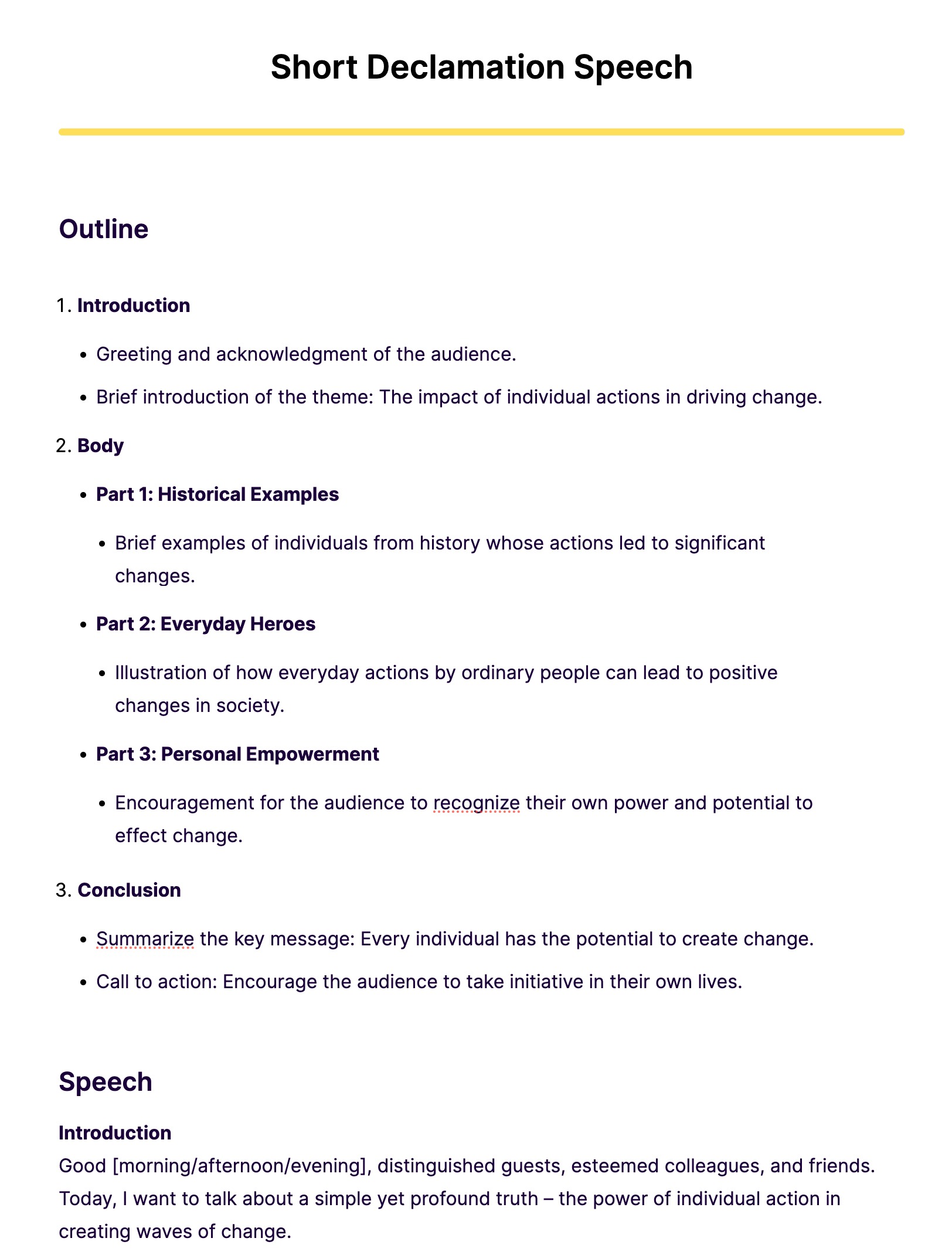
Declamation Speech for Students
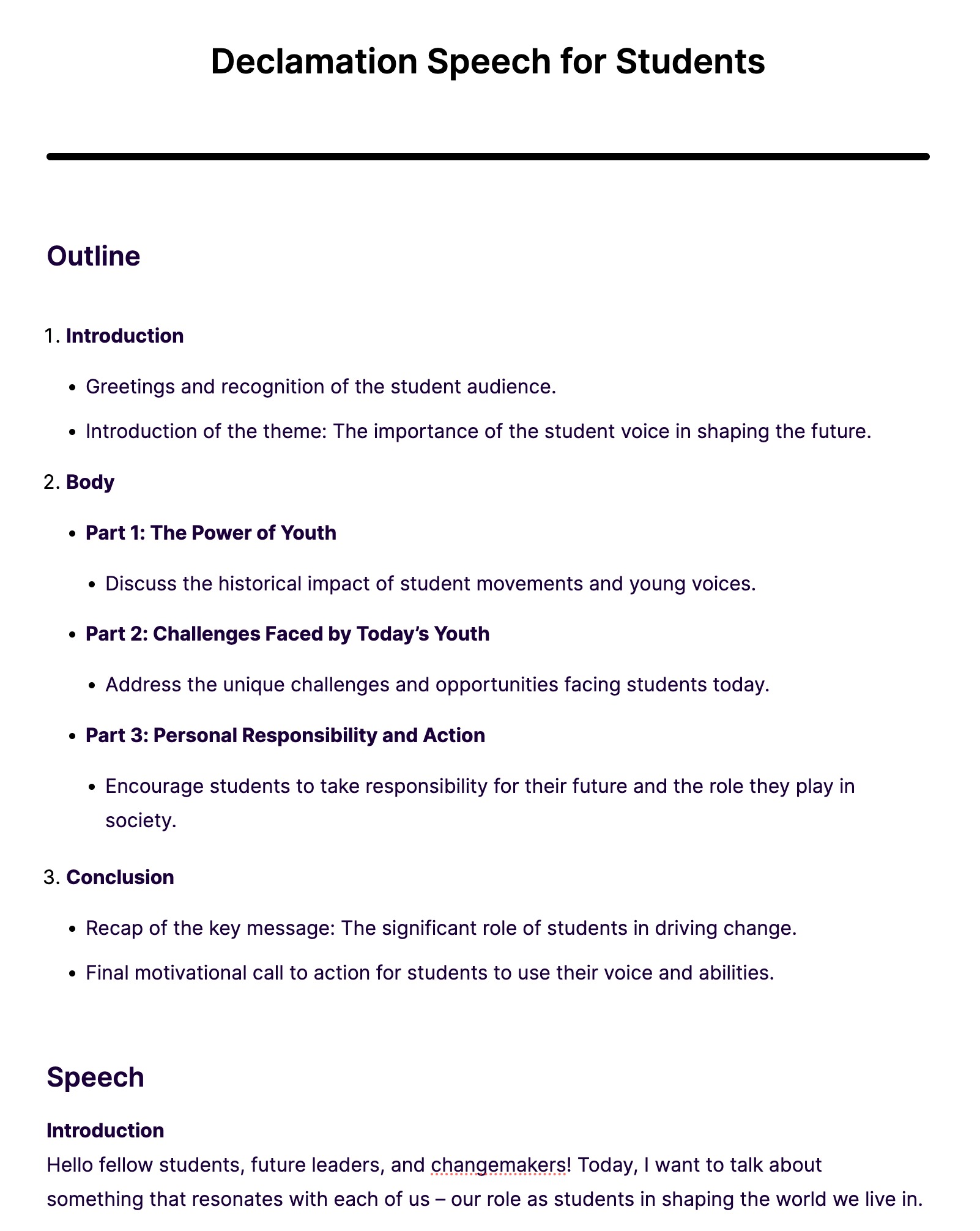
Declamation Speech for College Students

The Impact of Declamation in Different Speech Types
- Welcome Speech: In welcome speeches, declamation sets a welcoming and friendly tone, immediately engaging the audience.
- Motivational Speech: For motivational speeches, declamation is crucial in inspiring and energizing listeners, driving them to action.
- Celebration Speech: In celebration speeches, the declamatory style adds to the festive and joyous mood, effectively honoring the occasion.
- Narrative Speech: Declamation in narrative speeches helps in vivid storytelling, making the narrative more compelling and engaging.
- Appreciation Speech: When it comes to appreciation speeches, declamation allows the speaker to express gratitude and recognition in a heartfelt and sincere manner.
Characteristics of Declamatory Speech
- Emotional Expression: Declamation is marked by its ability to evoke and convey emotions effectively to the audience.
- Clear and Precise Communication: It involves delivering a message with clarity and precision, ensuring that the audience fully grasps the intended meaning.
- Dynamic Delivery: The use of varying tones, pacing, and body language keeps the audience captivated and emphasizes key points of the speech.
- Memorization and Preparation: Declamatory speeches are often memorized, allowing the speaker to focus on their delivery and the audience’s response.
Declamation and Storytelling Speech
Simple Declamation Speech
Crime Declamation Speech Example
Good Declamation Speech in PDF
Recalling Declamation Speech
Sample Declamation Speech
Inspiring Declamation Speech Example
Guidelines in Choosing Your Declamation Piece
Ever found yourself stuck in deciding what declamation piece to present? Most of the time, declamation speeches are speeches that were presented by another person, perhaps the writer of the speech, in a form of presenting his or her declamation piece. With the myriad of declamation pieces available, it makes you indecisive on what declamation piece you would want to present. Here are five simple guidelines that will help you in choosing your declamation piece:
1. You can present it with passion.
Choose a speech that you can pour your heart out as you deliver it. If you cannot present the piece with passion, you will surely sound fake and forced. There is no point at all in presenting a piece that does not hold any meaning to you. You may also see presentation speech examples & samples.

2. You can present it with conviction.
Choose a speech with a point or message that meets and agrees your principles in life. In this way, you will be able to present your chosen piece with conviction; thus, sounding convincing enough to your audience.
3. The speech has a natural build.
There are speeches that would make you sound robotic in that you need to exert more effort to adjust. Choose a speech that would start low at the beginning but would eventually reach to a climax that would excite and hook your listeners. You may also like speech examples for students.
4. The speech fits within the given time frame.
Always make sure that you choose a speech that fits the given time limit. Even if you meet all the given criteria but you fail to fit the time frame, then it still serves you no good. Choose a speech that does not go beyond the time limit and also surpasses half of the given time. You may also check out how to conclude a speech.
5. The speech can be understood by your audience.
Not all people can relate to every declamation piece out there so the least you can do is to make it understandable to your audience. Choose a speech that has a clear message so that it will be easy for you to deliver to the audience. It cannot be helped that there are topics that your audience can’t relate, and that you could not possibly know what kind of audience you deliver the speech to. But if given the opportunity to know who your audience are, make sure that your speech is worth listening for. You might be interested in appreciation speech examples & samples.
How to Judge Declamation Speech
Judging a declamation speech involves evaluating several key aspects:
- Content Understanding: Assess how well the speaker understands and interprets the speech’s content.
- Delivery: Evaluate the effectiveness of the speaker’s delivery, including voice modulation, clarity, pacing, and use of pauses.
- Emotional Appeal: Consider how effectively the speaker conveys the emotions and tone of the speech.
- Body Language: Observe the speaker’s body language, including gestures, facial expressions, and overall stage presence.
- Audience Engagement: Note how well the speaker connects with and holds the attention of the audience.
- Originality in Presentation: While the speech content is not original, look for originality in the way the speaker presents it.
- Adherence to Time Limits: Check if the speaker effectively manages their time and stays within the set limits.
Conviction Declamation Speech
Conscience Declamation Example
Short Declamation Piece
Example of Declamation Piece
Pain Declamation Piece
Declamation Piece Example
4 Simple Tips on How to Deliver a Declamation Speech
You do not need a lot of tips to enhance your delivery of a declamation piece. You just need the right ones to help you in improving your declamation speech delivery. Here are four simple and easy tips on how you should deliver your declamation pieces that will earn you a round of applause and a standing ovation from your audience:
1. Practice, Practice, and Practice.
Given that you have already written or researched your declamation speech, you should start practicing your piece more than once or twice. It is always effective that you rehearse in front of a mirror so that you could see yourself as you speak and identify the hand gestures you need to work on. It is also good to rehearse on your own so you can listen how you deliver the piece. You could also rehearse in front of someone you are comfortable practicing in front with so that the parts where you need to work on that go unnoticed as you practice by yourself will be noticed by other people who will help you in determining what are the other things in your speech delivery you should work on. You may also see introduction speech examples & samples.
Time yourself as you practice so that you would be able to train yourself in delivering your speech within the given time limit. If you find yourself exceeding the time limit, figure out the parts of the piece that you can speed up. Also, make sure that you are not sacrificing or compromising the quality of your speech. One example of compromising the quality of your speech is that you would already start eating your words which would result to people not understanding what you are saying at all. You may also like tribute speech examples & samples.
As you practice, make sure that you visualize yourself delivering your speech on the stage. You want to sound with authority and look confident? You can always visualize it. In doing so, you will eventually become exactly what you have envisioned yourself to be. You may also check out special occasion speech examples & samples.
2. Sound Natural.
Have you noticed that when you memorize something and then you deliver it, you sound robotic? It is because you are trying to deliver it like you are reading the paper. One way of helping yourself in sounding natural in delivering your speech while practicing is by making some markers. Take for instance this one paragraph taken from the declamation piece entitled “Am I to be Blamed?”:
Please/ let me go,/ let me go home before you imprisoned me.// Very well,/ officers? Take me to
your headquarters.// Good morning captain!// No captain,/ you are mistaken,/ I was once a good
girl,/ just like the rest of you here. Just like any of your daughters.// But time was, /when I
was reared in slums.// But we lived honestly,/ we lived honestly in life.// My father,/
mother,/ brothers,/ sisters, and I.// But then,/ poverty enter the portals of our home/// My
father became jobless,/ my mother got ill. The small savings/ that my mother had kept
for our expenses/ were spent. All for our daily needs/ and her needed medicine.//
Notice the slash symbols? Aside from the comma and the period, the slash symbols can be used as markers that will signify or help you in locating where you should pause. Without these markers, you would be talking straight. Talking straight makes you sound like someone void of emotions. You can also encircle the words and phrases you want to put on the emphasis. Marking helps you in making your own tempo of the declamation and will make you sound much alive. You might be interested in leadership speech examples & samples.
Sounding natural also helps you make a connection with your audience since it sounds like you are just having a normal conversation with them. Normal conversations would often engage and encourage people to listen.
3. Enhance Your Body Language.
Can you imagine yourself delivering your speech by only standing straight throughout your delivery and your face empty of emotions? According to experts, our body language takes up between 55% and 65% in our communication. That only means that no matter how good you are verbally and vocally but your body stands stiff and face void of emotions, then your speech could only make little to no impact on your audience. You may also see declamation speech examples.
Aside from the fact that enhancing body language helps in establishing a connection to your audience and an impact-filled stage presence, body language also helps you in expressing your declamation speech effectively. Since you have already expressed your speech well, this increases the percentage of retention of your speech in your audience. This will also help your audience in identifying which part of your declamation speech is the most impact-filled part. Use hand gestures to show the points where you want to emphasize. You may also like welcome speech examples & samples.
However, it does not necessarily mean that you have to make exaggerated hand gestures in every word of your speech. There are some lines in some declamation pieces where the absence of a hand gesture enhances the meaning of the line but always make sure that your facial expression compensates the absence of hand gestures. Always be mindful of your hand gestures since it can be your medium where you unconsciously show your nervousness or anxiety as you deliver your speech. Do not also make it to a point where you use hand gestures as a cover up to your forgotten lines or simply as decoration. You may also check out thank-you speech examples & samples.
4. Relax, Breathe, Smile, and Have Fun.
Delivering any kind of speeches can be nerve-racking but if you would allow yourself to be overwhelmed with nervousness, then chances are, you will really mess up your delivery big time. As the famous idiom goes “fake it ’til you make it”, make it a point that once you already feel nervous, fake confidence until it becomes real. Always distract yourself from thinking that you might trip or forget a line. Remember Murphy’s Law that goes “Anything that can go wrong will go wrong”. If you keep on thinking that things will go wrong, it will really go wrong. You just have to relax or else you will really trip or forget lines from your declamation speech. Just have fun and your audience will also have fun listening to you. You may also see orientation speech examples & samples.
If you still find it hard to focus and get rid of your nervousness, you can always focus on the message you want to point out to your audience in your speech. In that way, you can speak with conviction and will be able to deliver your message with genuine confidence. You may also like acceptance speech examples.
What type of speech style is declamation?
Declamation is a style of speech that is typically dramatic and impassioned. It often involves the delivery of a previously written or well-known speech, poem, or piece of oratory with a strong emphasis on emotional expression and powerful delivery. The speaker aims to convey the message or content with a high level of intensity, engaging the audience through their vocal and physical expressions. This style of speech is intended to captivate and move the audience, making it a classic form of persuasive and dramatic communication.
What is the difference between speech and declamation?
| Aspect | Speech | Declamation |
|---|---|---|
| Purpose | Can inform, persuade, entertain, motivate, etc. | Typically dramatic, often for entertainment or education. |
| Style | Can be formal or informal; various styles are acceptable. | Formal and often dramatic, emphasizing delivery. |
| Original Content | Can be original content created by the speaker. | Usually involves reciting existing speeches, poems, or oratory. |
| Context | Can be delivered in various settings and occasions. | Often used in educational settings, competitions, or for historical recitation. |
| Preparation | May be impromptu or prepared with varying levels of planning. | Typically involves rigorous preparation and rehearsal. |
General FAQ’s
What is the Declamation Speech Definition?
Declamation is a formal and dramatic speech style in which a speaker delivers a pre-existing speech, poem, or oratory, emphasizing passionate and expressive delivery to engage and move the audience.
What are the Good speeches for Declamation?
Good declamation speeches are typically emotionally charged and thought-provoking, often drawn from historical speeches, social issues, or literature, offering compelling content and opportunities for passionate delivery.
Declamation speech Introduction Examples?
Declamation speech introductions should captivate the audience. Examples include quoting famous lines, posing rhetorical questions, or sharing relevant anecdotes, setting the stage for a compelling and engaging presentation.
How long Should a Declamation Speech be?
The length of a declamation speech can vary but is typically 5-10 minutes. It should be long enough to convey the emotional impact of the piece while holding the audience’s attention.
Is declamation speech memorized?
Yes, declamation speeches are typically memorized. A key aspect of declamation is the dramatic and expressive delivery, which is best achieved when the speech is committed to memory.
Declamation speeches are a powerful tool in public speaking, capable of inspiring, motivating, and leaving a profound impact on audiences. From historical addresses to contemporary motivational speeches, their emotionally resonant and dynamic delivery continues to play a crucial role in effective communication, demonstrating the timeless art of connecting deeply with listeners.
Greatest Speeches of All Time by Famous Personalities
- I Have a Dream Speech by Martin Luther King, Jr.
- Theodore Roosevelt, “Duties of American Citizenship”
- Winston Churchill, “We Shall Fight on the Beaches”
- Lou Gehrig, “Farewell to Baseball Address”
- Demosthenes, “The Third Philippic”
- Chief Joseph, “Surrender Speech”
- John F. Kennedy, “Inauguration Address”
- Ronald Reagan, “Address to the Nation on the Challenger”
- “Speech of Alexander the Great”
- William Wilberforce, “Abolition Speech”
- Theodore Roosevelt, “The Man with the Muck-rake”
- Franklin Delano Roosevelt, “First Inaugural Address”
- Charles de Gaulle, “The Appeal of 18 June”
- Socrates, “Apology”
- George Washington, “Resignation Speech”
- Mahatma Gandhi, “Quit India”
- Winston Churchill, “Their Finest Hour”
- William Faulkner, “Nobel Prize Acceptance Speech”
- Dwight D. Eisenhower, “Farewell Address”
- Marcus Tullius Cicero, “The First Oration Against Catiline”
- Ronald Reagan, “Remarks at the Brandenburg Gate”
- Pericles, “Funeral Oration”
- General Douglas MacArthur, “Farewell Address to Congress”
- Theodore Roosevelt, “Strength and Decency”
- Abraham Lincoln, “2nd Inaugural Address”
- Patrick Henry, “Give Me Liberty or Give Me Death!”
- Ronald Reagan, “40th Anniversary of D-Day”
- John F. Kennedy, “The Decision to Go to the Moon”
- Frederick Douglass, “What to the Slave is the Fourth of July?”
- General Douglas MacArthur, “Duty, Honor, Country”
- Theodore Roosevelt, “Citizenship in a Republic”
- Winston Churchill, “Blood, Sweat, and Tears”
- Franklin Delano Roosevelt, “Pearl Harbor Address to the Nation”
- Jesus Christ, “The Sermon on the Mount”
- Abraham Lincoln, “The Gettysburg Address”
- Nobel Lecture by Mother Teresa
- Swami Vivekananda and His 1893 Speech in Chicago


